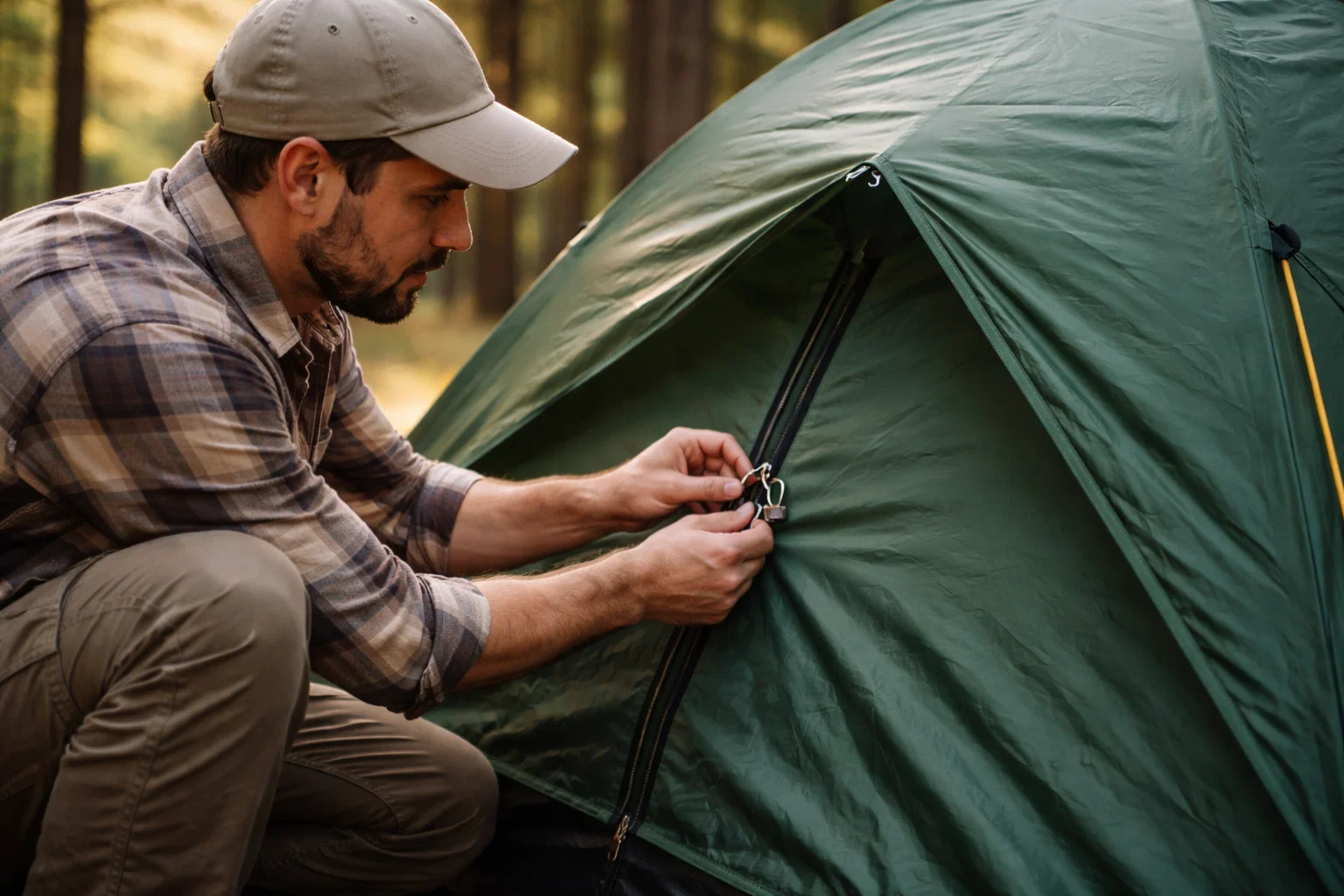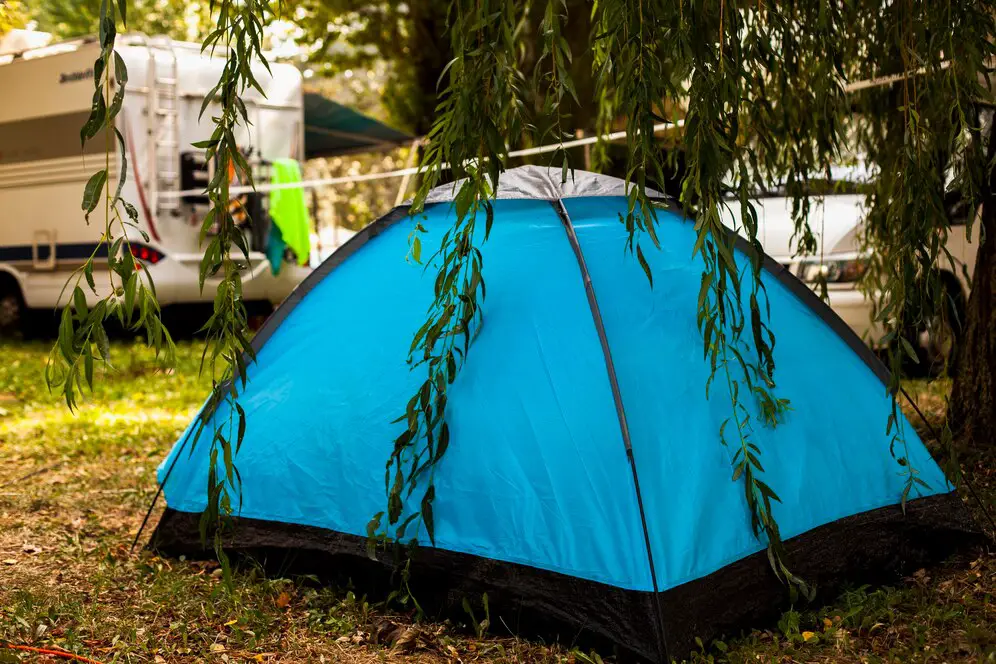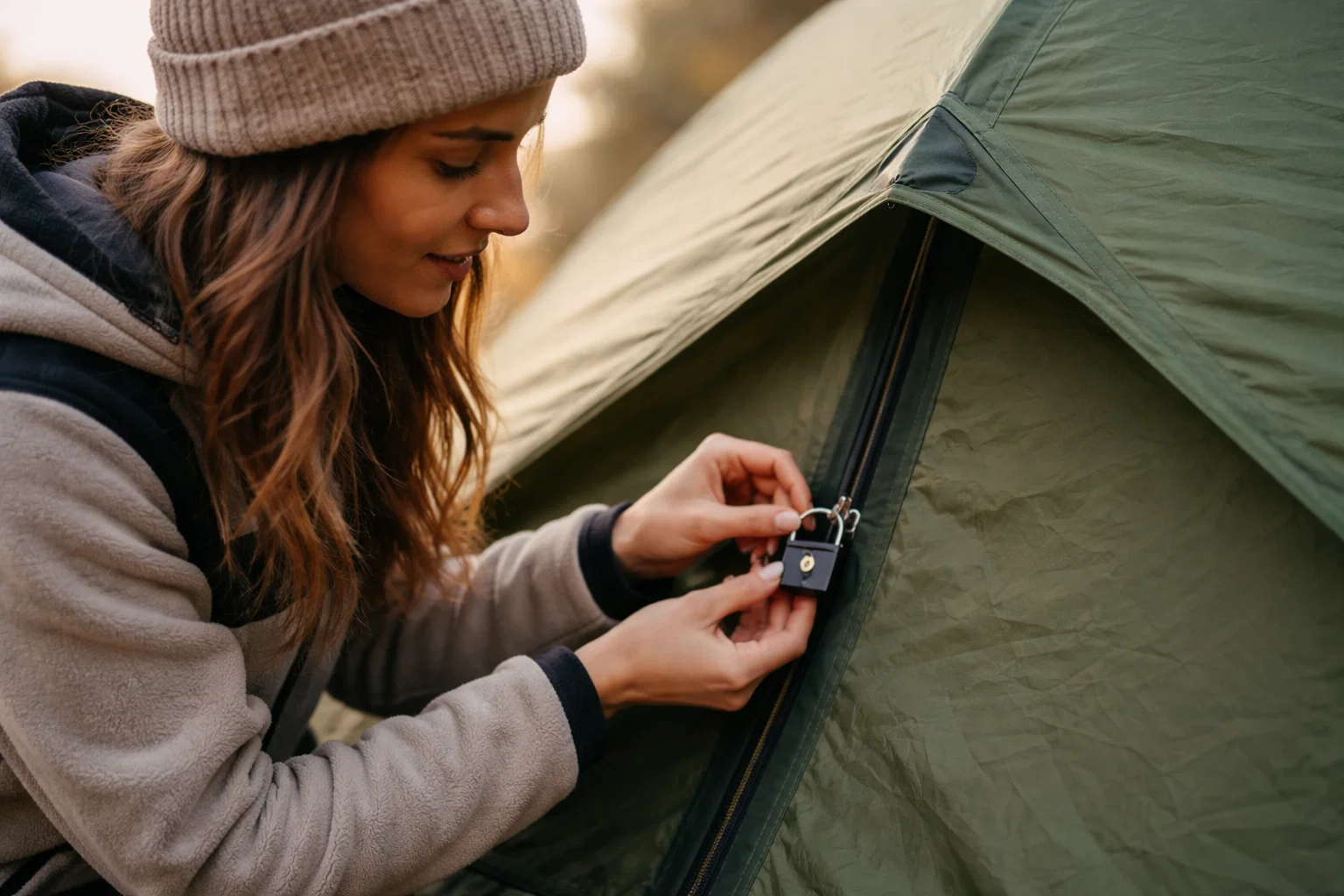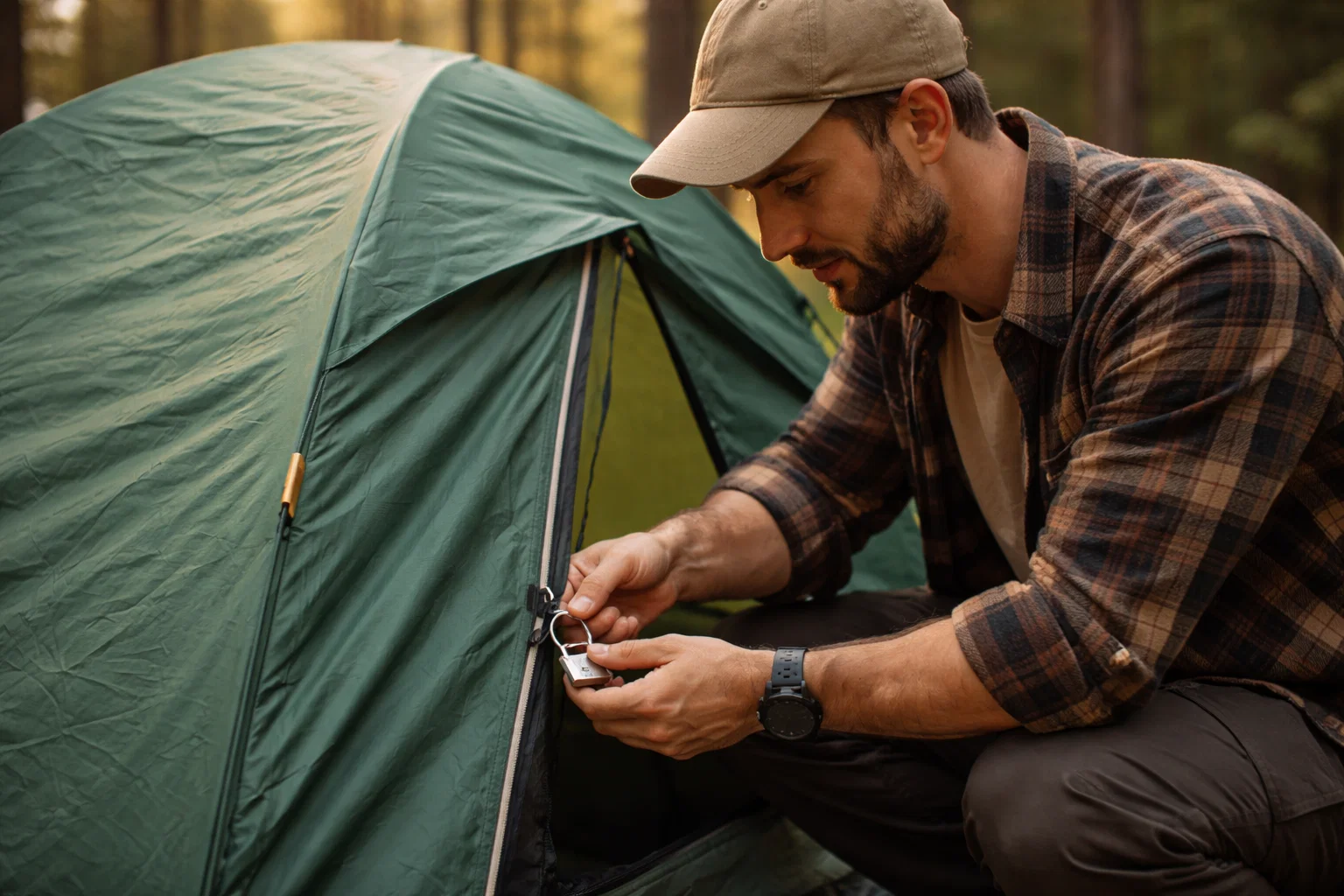This blog post may contain affiliate links. As an Amazon Associate I earn from qualifying purchases.

How to Lock a Tent: Expert Tips For Keeping Safe (2026 Guide)
Thieves often target tents tucked away behind vegetation or placed far from main pathways. The risk increases at festivals where stolen cash and alcohol remain common problems. You can secure your temporary home through several proven methods – from small cable locks for your zipper to smart campsite selection.
I’ll share my expert knowledge on tent security in this piece. You’ll discover everything from simple locking techniques to advanced protection strategies. These practical methods will help keep your tent and belongings safe, whether you’re at a crowded festival or enjoying a quiet wilderness experience.

Understanding Tent Security Basics
Tent security goes beyond protecting your stuff. My years of camping have taught me that knowing the simple rules of tent security leads to safer outdoor adventures.
Why secure your tent?
Theft at campgrounds and festivals has become more common. Thieves usually target electronics, cash, jewelry, and camping gear left alone in tents. Your tent’s security also helps you sleep better, especially in new camping spots.
Common tent security risks
Campers should watch out for these security risks:
Types of camping situations
Each camping scenario needs its own security plan:
Festival Camping: These events attract thieves looking for easy targets. You should use:
- Cable locks for tent zippers
- Portable safes for valuables
- Smart tent positioning
Wilderness Camping: Remote area security focuses on wildlife protection and weather safety. These Amazon products are worth checking out:
Established Campgrounds: These spots are
safer thanks to staff presence and marked camping areas. Notwithstanding that, you should keep up simple security habits and stay alert.
Your camping situation determines which security measures work best. To name just one example, pitching your tent near others creates a natural security network – campers tend to look out for each other. It also helps to build relationships with campground staff and nearby campers to boost overall security.
Essential Tent Locking Methods
Picking the right locking method for your tent needs a good look at several key factors. I’ve tested many security solutions and want to share the best ways to protect your temporary shelter.
Padlock options and features
Small padlocks give you a simple yet practical way to secure your tent. In stark comparison to this, visible padlocks might draw unwanted attention by hinting at valuable items inside. Your best options include:
- Lightweight combination locks that don’t put stress on tent fabric
- Weather-resistant materials that won’t rust
- High-contrast dials you can read easily in low light
Cable lock systems
Cable locks work better than traditional padlocks. These adaptable devices:
- Come with scratch-free, rust-resistant nylon coating
- Let you secure multiple zippers at once
- Slide through odd-shaped spaces without trouble
DIY security solutions
Budget-conscious campers have several proven DIY options available:
A quick and reliable method uses shoelaces or paracord. You can thread the cord through zipper holes and tie it with a square knot – this gives you decent security while maintaining easy access during emergencies.
Night security works better with a motion sensor light near your tent instead of just locks. Your tent’s location near busy areas naturally keeps thieves away.
The best security plan combines several methods. A mix of physical locks, smart positioning, and staying aware of your surroundings creates a solid security system.
Smart Campsite Selection
The right campsite location is vital to keep your tent secure. My outdoor experience over the last several years has shown that smart positioning can boost your camping safety by a lot.
Strategic tent positioning
Smart tent placement needs balance between easy access and security. Look for hazards like dead trees or branches that might fall [12]. Your tent should be:
- At least 200 feet from water sources to avoid wildlife encounters
- Away from lone trees that might attract lightning
- On level, durable ground such as rock, sand, or compacted dirt
- Water (1 gallon per person daily)
- First-aid supplies
- Battery-powered radio
- Emergency hand-crank charger
- Portable power devices
Recommended Security Products:
Evaluating campground security
Let’s get into everything in security before you set up camp:
Campground Safety Checklist:
| Feature | Security Consideration |
|---|---|
| Lighting | Well-lit paths and camping areas |
| Staff Presence | Regular security patrols |
| Emergency Access | Clear evacuation routes |
| Neighbor Proximity | Smart distance from other campers |
Do’s and Don’ts of Campsite Selection:
Local law enforcement often patrols campgrounds at regular intervals – they are a great way to get extra security. Building connections with nearby campers creates a natural security network. Fellow outdoor enthusiasts usually keep an eye out for each other.
Note that your location might be prone to natural hazards like flash floods and falling branches. You should pick a spot that shields you from the elements while other campers can still see you.
Advanced Security Tips

Technology has transformed how we secure tents, giving campers new ways to protect their temporary shelters. After testing security gadgets of all types, here are some advanced ways to go beyond simple locks.
High-tech security gadgets
Smart surveillance is now available to campers everywhere. Motion sensors combined with smart lighting systems work well to deter intruders by lighting up any suspicious movement. Here are some advanced options to think over:
Emergency preparedness
Your emergency kit should have enough supplies for 10-14 days. Here’s what you need:
Emergency Kit Checklist:
Professional recommendations
Security experts recommend these advanced measures:
Your security setup should include:
- Strategic camera placement around the campsite
- AI-powered security systems that recognize patterns
- 5G technology that provides up-to-the-minute emergency updates
Emergency Communication Protocol:
- Set up clear channels with campground staff
- Create designated communication centers
- Test equipment regularly
Keep emergency contacts handy and know where the nearest ranger station is. Satellite phones or amateur radios are great backup options when cell service is limited.
Final Thoughts – How to Lock a Tent
Most campers underestimate the importance of tent security. My years of outdoor experience have taught me that effective tent protection needs multiple security layers – from simple locks to smart positioning and modern technology.
Of course, a locked tent won’t stop determined thieves, but proper security measures substantially reduce theft risks. Smart campsite selection combined with appropriate locking systems and emergency preparedness creates a strong security framework for your outdoor adventures.
Your security needs change based on your camping environment. Festival camping needs different precautions than wilderness experiences. So adapt your security approach while you retain control of core protection principles.
The best tent security comes from awareness and preparation. Simple cable locks or advanced motion sensors coupled with staying vigilant and following these security guidelines will help ensure safer camping experiences. Pack your security essentials, choose your campsite wisely, and enjoy peace of mind during your outdoor adventures.
FAQs

Can you really lock a tent?
Yes, you can lock a tent using zipper locks, cable locks, or padlocks. While tents cannot be made theft-proof, locking them helps deter opportunistic thieves.
What is the best way to lock a tent zipper?
A small cable lock or combination padlock threaded through both zipper pulls is the most effective and least damaging option.
Are tent locks worth it?
Yes. Tent locks significantly reduce the risk of casual theft, especially at festivals and busy campsites where thieves look for easy targets.
Will locking a tent damage the fabric or zippers?
If you use lightweight locks and avoid overtightening, there should be no damage. Cable locks with nylon coating are the safest choice.
Is it safe to leave valuables in a locked tent?
It is best to avoid leaving high-value items in a tent. Even when locked, tents are not designed to withstand forced entry.
What should I do with valuables when camping?
Keep valuables on you, store them in a vehicle if possible, or use a portable travel safe secured to a fixed object.
Does locking a tent attract thieves?
Sometimes. A visible lock may suggest valuables inside. This is why campsite placement and discretion are just as important as locks.
Are tents more likely to be stolen at festivals?
Yes. Festivals have higher theft rates due to crowds, alcohol, and unattended tents. Extra security measures are strongly recommended.
Can I lock my tent from the inside while sleeping?
You should never fully lock yourself inside a tent. Always ensure you can exit quickly in case of fire, weather, or emergencies.

